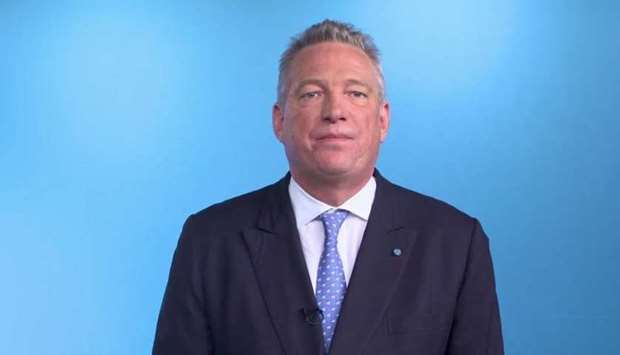The self-sufficiency of Qatar’s economy and the entrepreneurial drive that underpins SMEs in the country is pivotal to its success, says Paul Smith, President and CEO of CFA Institute.
Qatar’s emerging market status marked a milestone and has attracted billions of dollars from around the world, which has helped boost its economy, he said in an interview with Gulf Times.
Qatar has ambitious strategic objectives for its financial sector, within the context of the Qatar National Vision 2030, and has made great strides in building an efficient and transparent industry, points out the Hong Kong-based Smith.
As one of the most important financial markets in the Arab region, Qatar is working hard to maintain the stability of its financial markets under the economic and financial crises facing various sectors, especially the oil sector, he said.
There are also human capital issues that Qatar faces, as it prepares for a place in the 21st century global economy. It is, therefore, important that Qatar continues to reform and grow education and training efforts in the realm of investing and CFA Institute is a great partner to support this, said Smith who was here to attend the ‘2017 Doha Investment Forum’ hosted by the CFA Society Doha.
Smith pointed out the investment industry was witnessing major global changes – a global drift in the advisory business towards passive investing, fee compression, robo-advice, a complex and shifting regulatory environment, technology disruptions, and demands for more transparency.
“It is easy to see that investment services seem to be replicable at a cheaper rate and this is of concern. Our industry needs to more firmly establish its value proposition: one that is built on the best outcomes for our clients.
“In these changing times, investors in the GCC region need investment professionals that they can trust and that provide high-quality expertise. It is, therefore, critical that we continue to professionalise our industry in the GCC region and make investing more relatable, transparent and client-led. By doing this, we will not only reclaim confidence but we can positively contribute to the growth of financial markets,” Smith said.
Qatar, he said, has ambitious aims of enhancing investor protection through standards and codes of conduct and building talent through professional developments, which are very much aligned with the mission of CFA Institute and CFA Society Doha.
The fundamental purpose of capital markets and investment management is to contribute to society through increases in society wealth and well-being.
“As leaders of the investment profession in Qatar, our members, CFA Societies, and CFA Institute, all work together to advance ethics, raise professional standards of practice, and increase market integrity,” Smith said.
Specifically, CFA Society Doha serves its members by providing a regional forum for the discussion of investments, economics and finance and promotes high standards of expertise and conduct among investment managers and analysts.
“By building credibility and professionalism in financial markets, we can deliver trust and contribute value to Qatar’s national economy and society at large,” Smith said.
On the challenges being faced in developing a competent pool of (local) financial analysts in the region, he said, “Citizens demand a high standard of competence, ethics, and best practice from doctors, architects, and engineers. In return, society accords these occupations the status of professions. It is up to investment professionals to earn our place among these respected professions.
“Of course, we want our industry to prosper and grow—there is nothing wrong with the pursuit of asset accumulation, profits, and organizational growth. However, we must earn the seal of approval of society by using our knowledge for the public good, not profit maximisation.
“This means having a strong commitment to professionalism as investment practitioners and achieving our fundamental purpose - to contribute to society through increases in societal wealth and well-being.”
Currently, there are 106 CFA charterholders in Qatar and 210 candidates registered for CFA exams. There is the potential to double the number of CFA charterholders in Qatar over the next few years.
This, he said will help to increase the number of qualified professionals upholding the highest standards in financial markets and develop a competent pool of local, financial analysts in the region.


